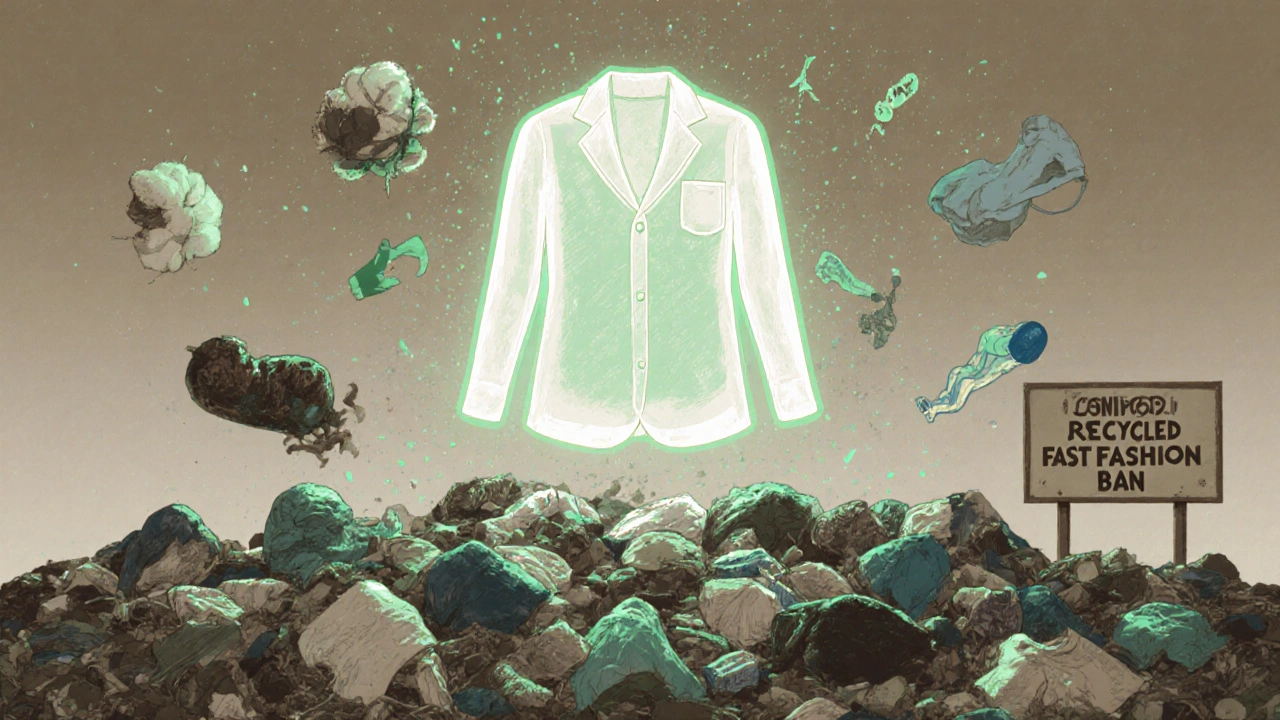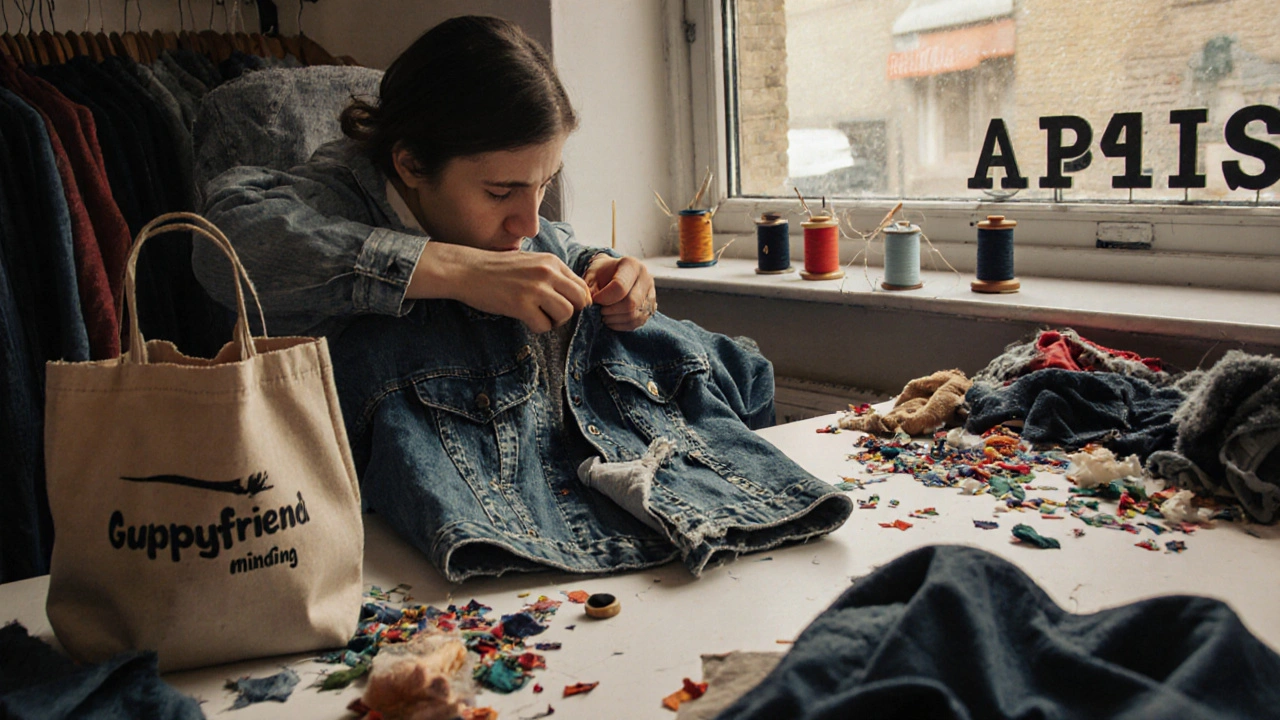
London isn’t just about the Tube and the Thames anymore. Over the last five years, it’s become one of the most active hubs for sustainable fashion in Europe. You can walk through Shoreditch or Notting Hill and see more people wearing clothes made from recycled ocean plastic than you can those made in factories overseas. This isn’t a trend-it’s a shift. And it’s happening fast.
Why Sustainable Fashion Matters in London
Every year, the UK throws away 300,000 tonnes of clothing. That’s the weight of 150,000 double-decker buses. Most of it ends up in landfills or gets burned. In London alone, the average person buys 26 new items of clothing each year. That’s more than one a month. And yet, the average garment is worn just seven times before being discarded.
Fast fashion isn’t just wasteful-it’s toxic. Synthetic fabrics like polyester shed microplastics every time they’re washed. These end up in rivers, then oceans, then fish, then our dinner plates. The fashion industry produces 10% of global carbon emissions-more than international flights and shipping combined.
But here’s the good news: Londoners are changing. A 2024 survey by the London Environment Directorate found that 68% of residents under 35 now consider a brand’s environmental impact before buying. That’s up from 32% in 2020. People aren’t just talking about sustainability-they’re voting with their wallets.
Top 7 Eco-Friendly Clothing Brands Based in London
These aren’t startups hiding on Etsy. These are real brands with physical stores in London, transparent supply chains, and verified certifications. You can walk into them, try things on, and know exactly where your clothes came from.
- People Tree - Founded in 1991, this is one of the original fair trade fashion brands. They use GOTS-certified organic cotton, TENCEL™ lyocell, and recycled wool. Their London flagship on King’s Road has been operating since 2015. Every piece is made in Fair Trade certified factories in India, Nepal, and Bangladesh. Prices range from £35 for a tee to £180 for a coat.
- Reformation - Though originally from LA, Reformation opened its first UK store in London in 2023. They track the water and carbon footprint of every item using their RefScale tool. Their dresses are made from deadstock fabric-leftover material from other designers that would’ve been thrown away. Their bestseller, the ‘Lola Dress’, uses 70% less water than a conventional cotton dress.
- Stella McCartney - The luxury name everyone knows. But what you might not know is that Stella McCartney has never used leather, fur, or virgin polyester since its founding in 2001. Their London store on Sloane Street uses solar panels and recycled paper hangers. Their ‘Falabella’ bag is made from recycled plastic bottles. It costs £1,200, but lasts 10 years.
- Veja - While not a clothing brand, Veja’s sneakers are worn by half of London’s sustainable fashion crowd. Their sneakers use wild rubber from the Amazon, recycled plastic bottles for mesh, and organic cotton. They’re sold in 12 London stores, including Selfridges and their own Soho pop-up. A pair costs £105.
- Eileen Fisher - This US brand has a growing London presence. Their ‘Take Back’ program lets you return old Eileen Fisher clothes for store credit. They’re then repaired, resold, or recycled into new fabric. Their London pop-up on Camden High Street offers free mending services every Saturday.
- By Rotation - This isn’t a brand, but a platform. Think Airbnb for clothes. Londoners rent out their designer pieces for £5-£30 a day. You can wear a £500 coat for £12. The app has 120,000 users in the UK, mostly in London. It cuts waste and saves money. It’s the cheapest way to try sustainable fashion.
- Organic Basics - Danish brand, but their UK warehouse is in East London. They make basics-tees, socks, underwear-using 100% organic cotton, recycled nylon, and TENCEL™. Everything is packaged in 100% recycled and recyclable paper. Their ‘Essentials Pack’ (5 tees + 2 pairs of underwear) costs £79. It’s the go-to for people who want to rebuild their wardrobe from scratch.

How to Spot Real Sustainability (Not Greenwashing)
Not every brand calling itself ‘eco-friendly’ actually is. Here’s how to tell the difference:
- Look for certifications: GOTS (Global Organic Textile Standard), Fair Trade, B Corp, or OEKO-TEX. These are third-party verified. A brand saying ‘we care’ doesn’t count.
- Check the fabric: Avoid ‘polyester’, ‘nylon’, or ‘acrylic’ unless it’s clearly labeled ‘recycled’. Natural fibers like organic cotton, linen, hemp, and TENCEL™ are better.
- Ask ‘Where was this made?’ If the answer is ‘somewhere in Asia’ or ‘we don’t know’, walk away. Brands that care publish factory locations.
- See if they repair or take back old clothes. If they don’t, they’re still selling disposable fashion.
- Check their transparency report. Brands like People Tree and Eileen Fisher publish annual impact reports with real numbers: water saved, CO2 reduced, wages paid.
One brand to avoid: Boohoo. They’ve been fined £1.2 million by the UK government for labor violations and misleading sustainability claims. They still advertise ‘eco’ collections-but their main business is 100% fast fashion.
Where to Shop in London (Beyond Online)
You don’t need to shop online to go sustainable. London has a growing network of physical spaces where you can touch, feel, and try on ethical clothes.
- ReFashion - A secondhand boutique in Hackney with curated vintage and deadstock pieces. Everything is under £40. They host monthly repair workshops.
- The Refill Shop - Not just for clothes. This shop in Peckham lets you bring your own bags to refill detergents, soaps, and even fabric softener. They also sell organic cotton tees made locally in East London.
- London Fashion Exchange - A monthly swap event in Shoreditch. Bring 5 items you don’t wear, take 5 new ones. Free to join. No money changes hands. Last month, 800 people swapped 4,000 items.
- Vintage Markets - Portobello Road, Camden Market, and Greenwich Vintage Market have dozens of stalls selling pre-loved designer pieces. A £200 Gucci bag can cost £35 here.

What You Can Do Right Now
You don’t need to buy everything new. Here’s how to start today:
- Wash clothes at 30°C. It saves energy and extends fabric life.
- Use a Guppyfriend bag when washing synthetics. It catches microplastics before they enter drains.
- Repair one item this week. A seamstress in Peckham charges £8 to fix a torn hem.
- Swap clothes with a friend. No cost. No waste.
- Donate unwanted clothes to British Heart Foundation or Salvation Army. They sort, resell, or recycle everything.
The goal isn’t perfection. It’s progress. One less polyester shirt bought. One more garment repaired. One more day wearing something that didn’t cost the planet.
What’s Next for Sustainable Fashion in London?
London City Council passed the Fast Fashion Ban in March 2025. It doesn’t ban fast fashion-but it bans stores over 2,000 sq ft from selling more than 10% of their stock made from virgin polyester. That means big chains like Zara and H&M will have to change their models by 2027.
Meanwhile, the UK government is funding a £20 million project to turn textile waste into new fabric. A pilot plant in East London can now turn old jeans into new yarn with zero water use. By 2027, they hope to recycle 30% of UK textile waste.
Sustainable fashion in London isn’t about being perfect. It’s about being present. It’s about knowing where your clothes come from-and choosing to care.
Are sustainable clothes really more expensive?
They cost more upfront, but last longer. A £80 organic cotton shirt from People Tree lasts 5-7 years with normal wear. A £15 H&M shirt lasts 6 months. When you break it down, sustainable clothes cost less per wear. Plus, renting or swapping cuts costs even further.
Can I still wear fast fashion if I recycle it?
Recycling isn’t a fix. Most fast fashion can’t be recycled because it’s made of blended fabrics. Even when it can, the process uses chemicals and energy. Recycling is better than landfill, but it’s not the solution. The real fix is buying less and choosing better materials from the start.
Is organic cotton better than recycled polyester?
Organic cotton uses less water and no pesticides than regular cotton, but it still needs land and water. Recycled polyester uses plastic waste and saves oil, but sheds microplastics. Neither is perfect. The best choice? TENCEL™, hemp, or linen-low impact, biodegradable, and durable.
Where can I get my clothes repaired in London?
Try ReFashion in Hackney, The Mending Project in Brixton, or London Sewing School in Shoreditch. Most charge £5-£15 for basic repairs. Some offer free mending days. Check their websites for schedules.
Do sustainable brands offer plus sizes?
Yes, but slowly. Eileen Fisher, People Tree, and By Rotation all offer sizes up to 22. Reformation has expanded to size 18. Smaller brands like Stitch & Story focus on inclusive sizing. The market is growing, but it’s still behind fast fashion. Demand is the key-ask brands for more sizes.
What’s the most affordable way to start sustainable fashion?
Start with secondhand. Visit thrift stores, swap events, or use By Rotation. Buy one new item a year-preferably from a brand like Organic Basics or Veja. Focus on quality over quantity. You don’t need a whole new wardrobe. Just a few better pieces.